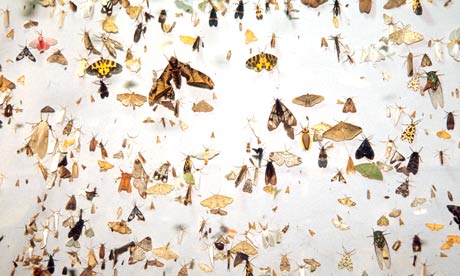Some numbers are fundamental and iconic: think pi in mathematics and the speed of light in physics. They provide a cornerstone upon which a vast edifice of science can be built, leading ultimately to much of our prosperity and wellbeing. In the messier but much more tangible world of biology, numbers are also important. I'd currently pick 7bn as critical: it's the number of humans predicted to be living on Earth by the end of October.
But there's another, even more fundamental, biological number which has defied attempts to pin it down for over 250 years: the number of different species with which we share the planet. Now, a landmark paper has taken a huge stride forward in discovering the true richness of life on Earth, estimates of which had ranged from 3m to 100m species.
The number, say the scientists, is 8.7m and I believe it too deserves iconic status. Why? We humans are evolutionary latecomers in the extreme, having stalked the planet for only the most recent fleeting moments of its 4bn-year history. The biosphere we have colonised so successfully was created by myriad interactions between creatures, rocks and weather.
As we begin to dominate these processes - entering the Anthropocene - we are increasingly realising how dependent we are on our fellow species and the habitats they dwell in for our water, food and livelihoods.
There is wide agreement that reversing the "sixth mass extinction" currently being wreaked by our activities is vital. But what could that actually mean, when the tally of life on Earth was so uncertain?
The figure of 8.7m gives a firm starting point, but no more. About 90% of the species are unknown to science, a startling and humbling proportion. Just 1% are monitored by the IUCN's Red List. Who knows what services those anonymous organisms provide? There are about 90,000 unknown plants, some of which could transform food production. The task now is to speed up the discovery of those fauna and flora.
The grim "good news" for taxonomists is that their monumental task is getting a little easier each day. Destruction of habitat and overexploitation of the seas are now eradicating more species than are evolving naturally - the first time this has been so since the demise of the dinosaurs. Species are becoming extinct at a rate about 1000 times faster than before humans began to dominate the world.
Just the last week, we've learned that animals are fleeing the impacts of climate change far faster than thought. Many will fail to find a safe haven. And hidden beneath the visible loss of biodiversity is an even greater loss of genetic diversity, according to another new paper.
There are of course caveats to the 8.7m figure: it's biology, not physics. The number is an extrapolation of a mathematical relationship between different levels of taxonomic classification, tested against well known groups of animals. It has error bars of plus or minus 1.3m, and omits bacteria and viruses. (You can read the paper here, Mora et al.)
But the fundamental importance of the number remains. As one of the scientists behind it, Boris Worm of Dalhousie University, says: "If we did not know - even to an order of magnitude - the number of people in a nation, how would we plan for the future?"
The same applies, but more so, to the number of species on the Earth.

